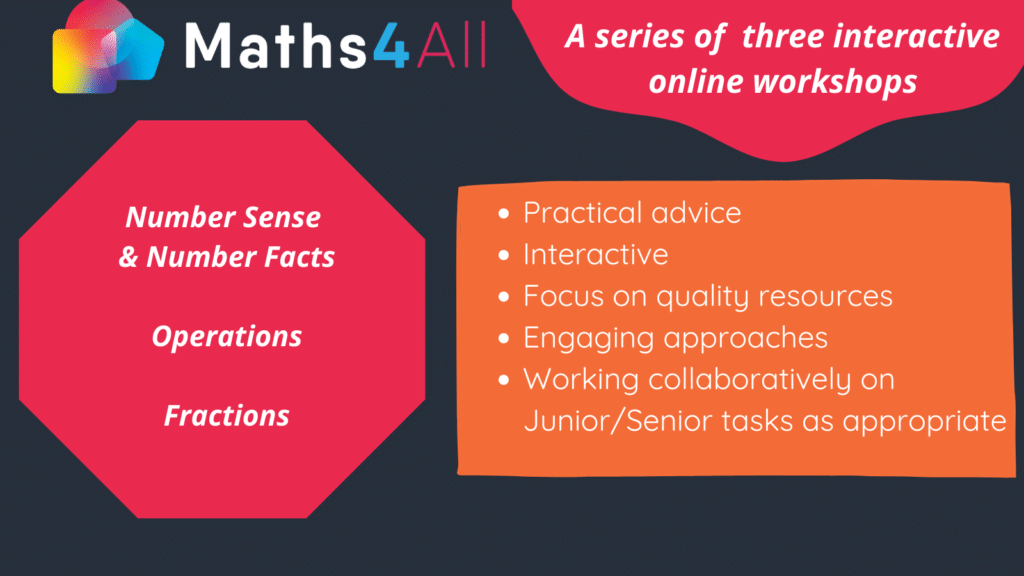Webinars
In collaboration with Clare Education Centre. To provide feedback on these events please click the link below.
In collaboration with Clare Education Centre. To provide feedback on these events please click the link below.

Blair Minchin is a primary teacher based in Scotland. He is very active on social media, sharing his classroom practice and encouraging other teachers to try new ideas. In addition to a focus on playfulness in upper primary, Blair has shared his practice involving teaching music, the effective use of digital technologies, and teaching using the Sustainable Development Goals.
The new primary mathematics curriculum lists ‘encouraging playfulness’ as a key pedagogical practice. While playful approaches based on the Aistear framework are common in junior primary, many teachers are a unsure about how playfulness might be encouraged in senior primary. In this webinar, Blair Minchin will share his approach to playful mathematics learning in senior primary.

Dr Lorraine Harbison is an Associate Professor in Mathematics Education in the School of STEM Education, Innovation and Global Studies at the Institute of Education, Dublin City University. She has a particular interest in researching innovative teaching pedagogies to foster mathematical understanding. Some projects that she is currently involved in include examining the factors that contribute to the successful transition in mathematics education for pupils moving from primary to post-primary school, and embedding children’s literature and creative writing in mathematics teaching and learning.
Dr. Harbison was the numeracy coordinator for the Department of Education commissioned report Towards a New Literacy, Numeracy and Digital literacy Strategy. In this webinar, she will share lessons from the literature on effective ways to develop and assess critical numeracy skills. She will also offer practical guidance and ideas applicable across all educational levels, from early years to post-primary.

Dr. Seán Delaney is Registrar and Vice President (Academic Affairs) of Marino Institute of Education in Dublin. His teacher education and research activities are informed by his primary teaching experience, which spanned eleven years. He received his PhD in Teaching and Teacher Education from the University of Michigan. His dissertation, entitled “Adapting and Using U.S. Measures to Study Irish Teachers’ Mathematical Knowledge for Teaching,” and subsequently authored a report for the Irish Department of Education and Science on “Irish Primary Teachers’ Mathematical Knowledge for Teaching.” His research interests are in the practice of teaching, teacher education, mathematics education, teacher knowledge, and comparing professional knowledge across countries.
Dr Carol-Ann O’Siorain, is Assistant Professor of Early Childhood Education in the IoE at
Dublin City University. Carol-Ann’s research interests are in the areas of special and
inclusive pedagogy, early intervention strategies and supports 0-8 years, supporting learners
with intellectual disabilities and syndrome specific learning needs, the voice and role of
parents in education, literacy and numeracy and the child with additional needs, and the role
of play and playfulness in advancing communication and access to learning. In this webinar
entitled; Supporting learners with additional needs in mathematics, Carol-Ann addresses common areas of need across multiple challenges.
Aisling Twohill is a lecturer in Mathematics Education, in the School of STEM Education, Innovation and Global Studies. Her research interests encompass the role of shape patterning in children’s developing thinking; and assessment of children’s thinking through task-based interviews. Aisling’s ongoing research projects include an international collaboration to develop materials for the teaching of algebra in senior primary and junior secondary school; and a collaborative project in DCU investigating the efficacy beliefs of student teachers about the teaching of mathematics. Aisling was invited by the NCCA to act as a critical friend in the development of the revised Primary School Mathematics Curriculum Algebra Strand. Here, she supported the translation of research and theory into the description of prescribed content for teaching.
In this webinar, titled; ‘Thinking algebraically in primary school’, Aisling will explore the role of algebraic thinking in light of the new curriculum.

Dr. Aisling Leavy is Head of the STEM Education Department at Mary Immaculate College along with Associate Editor of Statistics Educational Research Journal. She authored the NCCA commissioned research paper titled; ‘Data and Chance in the senior primary classes’. Aisling’s research interests include children’s mathematical thinking, the development of statistical reasoning, Lesson Study, the mathematics preparation of pre-service teachers, STEM education and the development of conceptual understanding of mathematics in primary classrooms.
In this webinar; Developing Data Detectives and Statistical Thinkers in the Senior Primary Classes, teaching data and some of the recommendations from the NCCA report will be outlined and explored. The NCCA report is available here.

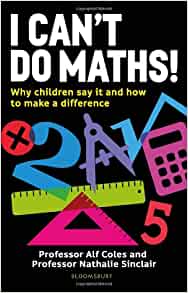
In this presentation, Alf will challenge two ideas which appear commonly held, the first is that mathematics is a building block subject and the second is that maths is hard because it is abstract. The session will trace some of the historical roots of these ideas and why they might now be problematic. There will be opportunities for engagement in classroom tasks and discussion.
Alf is a Professor of Mathematics Education at the University of Bristol. With colleague Nathalie Sinclair, he has published recently the book “I can’t do Maths!: Why children say it and how to make a difference”. Alf worked for 15 years teaching mathematics in schools before moving to the University in 2010. He was educational consultant with the UK’s National Centre for Excellence in Teaching Mathematics in the development of their Mastery professional development materials.
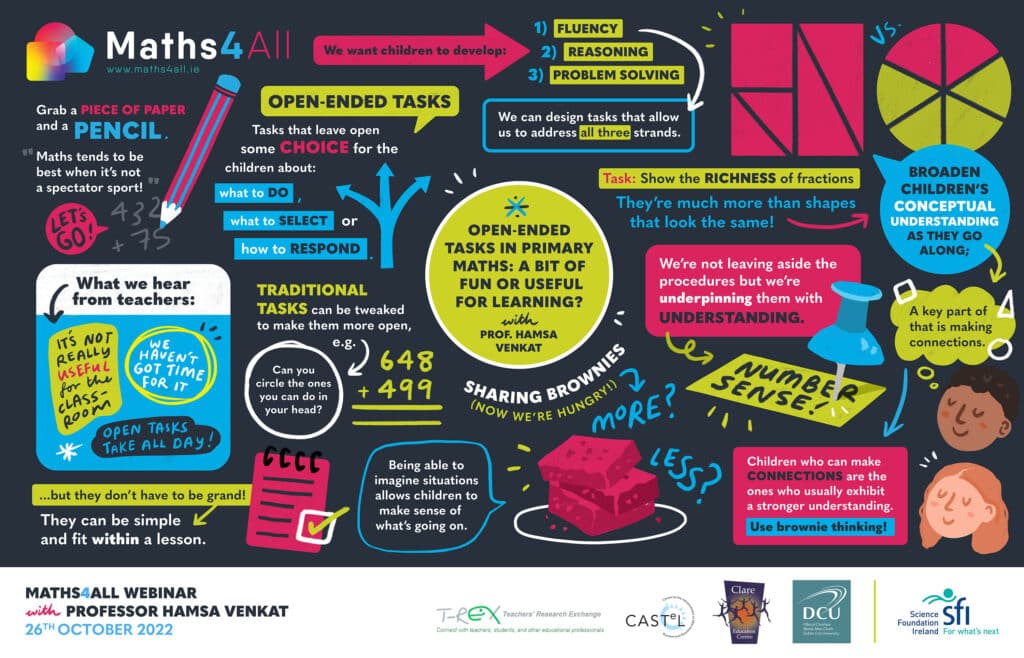
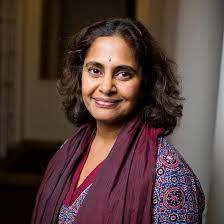
Professor Hamsa Venkat holds the Naughton Family Chair in Early Years/Primary STEM Education in the School for STEM Education, Innovation and Global Studies, DCU Institute of Education. Her research focuses on primary mathematics teaching, learning, curriculum and policy, with a particular interest in interventions seeking to improve these aspects. Before joining DCU, she held the position of SA Numeracy Chair at the University of the Witwatersrand in Johannesburg, South Africa
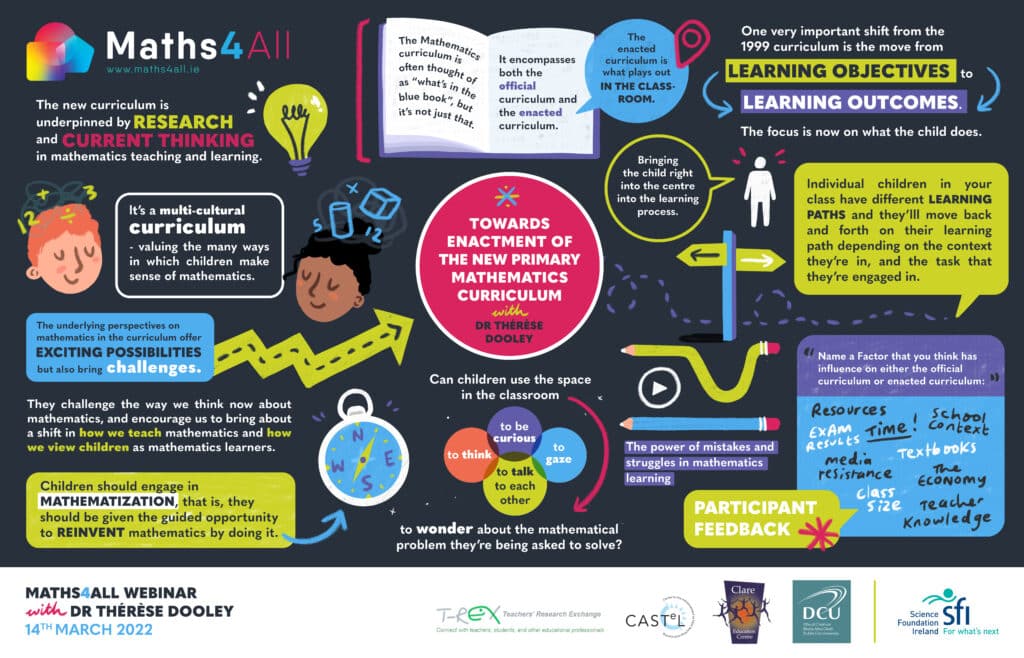
The main focus of this webinar is the new primary mathematics curriculum. The webinar will be divided into three parts. In the first part, attention will be given to some of the findings of three research reports on Mathematics Education published by the National Council for Curriculum and Assessment to underpin this curriculum. In the second part, alignment between the official curriculum and the curriculum as enacted in classrooms, and the factors that influence this alignment will be considered. Finally, a video recording of a mathematics lesson will be examined with reference to the preceding discussions. It is expected that the webinar will be interactive in nature and will provide an opportunity to participants to reflect on the nature and purpose of mathematics teaching and learning..
Dr Thérèse Dooley is Emeritus Associate Professor at DCU Institute of Education. One of the lead authors of the NCCA desktop review of research on mathematics education at early-childhood level, she authored an addendum on primary mathematics. She was a member of the STEM Education Review Group that conducted a comprehensive review of STEM Education in Irish schools, and was Chair of the Tenth Conference of the European Society for Research in Mathematics Education held in Dublin in 2017. Passionate about learners’ development of powerful mathematical thinking, she continues to work, research and publish in the area.
We presented our first webinar, A Problem-Solving Approach to Teaching the Strand of Number, in conjunction with Clare Education Centre on 25th March 2021. The goal of this webinar was to provide practical advice on using a problem-solving approach. Short video clips and examples of children’s work, which were gathered as part of the Maths4All project, were used to help illustrate the potential of a problem-solving approach to teaching mathematics.
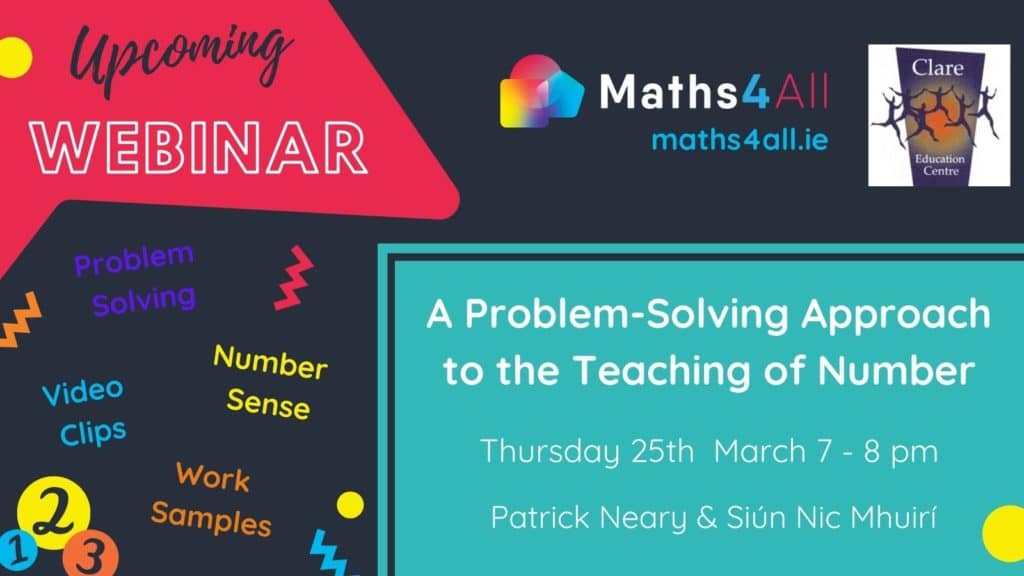
Building on this we ran a series of three-webinars/professional learning community meetings in October/November 2021. These workshops were facilitated by Patrick Neary, Sinéad McGill, Edward Fitzgerald and Siún Nic Mhuirí.
